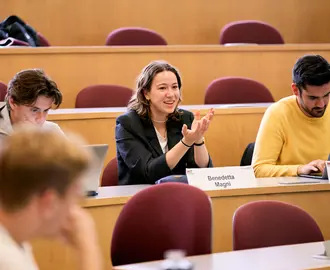Laura Wacker, MFin '17
If you ever wanted to know about the “before and after” of the MIT Sloan Master of Finance program, Laura Wacker, MFin ’17, is your go-to person. Starting out in a hedge fund, Laura leveraged the flexibility of the MFin program to switch gears and take a deeper dive into the world of finance. She customized her 12-month master’s experience and is continuing to explore how different facets of finance can help in solving real-world problems.
Tell me a little bit about yourself. Did you have any experience in finance before coming to MIT Sloan?
Before the MFin program, I worked at a hedge fund in Connecticut. I was working on counter-party risk management and sitting in between the portfolio managers and the traders. It was a great introductory role into finance and markets, but I knew that there was more to learn.
Why did you choose MIT Sloan?
I was mostly attracted to the MFin program because of its flexibility, which allowed me to explore different avenues that interested me. For example, I could take a PhD-level economics class in the fall and explore that. Meanwhile, I could also take classes completely unrelated to quantitative analysis like Business Law.
Tell us about your overall MFin experience? Did you pursue a concentration?
I did the 12-month MFin program, but wish I had done the 18-month program because I loved the experience so much. It was great for me because I came into the program with prior work experience, so I didn’t feel like I needed that internship period.
I didn’t pursue a concentration, mostly because I wanted to explore a number of different interests. I was attracted to the financial engineering concentration, but only wanted to take other unrelated classes like macroeconomics. I enjoyed the option of taking classes at Harvard as well as MIT undergraduate classes. It seemed like any class at MIT was open to me, which I knew was the case from attending MIT as an undergraduate. I went back to MIT Sloan for that specific flexibility.
Did you have any standout moments or projects while in the program?
One standout moment was the Proseminar class and the project I worked on with Senior Lecturer Mark Kritzman. It was a 10-person team, which is huge. Seeing that project come together, working on a small piece of it myself, and then seeing my teammates come in with their work and having it all fit nicely together was very satisfying.
Presenting that project was another standout moment. In the workplace, I didn’t get a lot of time to present and work on my communication skills as a junior person in finance. The MFin program was a great way for me to improve my presenting and communicating skills. One thing that gets kicked to the side in finance is presenting your findings. You’re working on this complicated data and one of the more important things is taking that work and presenting it. At Sloan, there are lots of opportunities to work on that skill, whether in the Proseminar, the Finance Research Practicum, or just speaking in class.
Which classes did you enjoy the most and why?
I chose a mix of different classes rather than a focused approach. I really enjoyed Business Law, which is not related to quantitative finance at all. I still remember some of the examples throughout history, and the concepts are forever relevant. I also enjoyed Fixed Income with Professor Deborah Lucas, who’s a great presenter and a real quantitative person.
My favorite class overall was Macroeconomics, which was taught jointly by Professor Tavneet Suri and Roberto Rigobon. They presented macroeconomics in a very different light from the standard textbook equations method, brought in real-life examples, and had different members of the class interact and strategize as countries.
Women are underrepresented in finance. Have you experienced any challenges in the industry due to that?
We’re definitely underrepresented in the field. But at my current job, I’ve found that we stick together and support each other and that’s been really nice to experience.
I will say that at Sloan, I did not feel underrepresented. Sloan does a very good job of recruiting a class with students who are open minded. I found all my classmates to be overwhelmingly friendly. On top of that, many of my favorite professors were women, including Professors Suri and Lucas. You can look up to them and know it’s proof that you can make it, too.
What is your current role professionally?
I am an assistant vice president at State Street Global Markets. I work on the electronic FX trading team, developing strategies for pricing currencies to our clients. So, if a client comes in and wants to buy some euros and sell some dollars, our computer will spit out a price back to them. I’m responsible for coding up how to generate that price to the client. It’s very quantitative, and I use my MFin background every day at my job.
What MIT Sloan resources did you use to land your full-time offer?
I actually found my job through one of my classes at Sloan. For the Action Learning component of the degree, I took the Proseminar in Capital Markets with Senior Lecturer Mark Kritzman. The project my team worked on was with State Street Associates, a quantitative research team within State Street Global Markets. They sponsored a project in the Proseminar, and I liked the people. Professor Kritzman consults with them and also teaches at Sloan. He is a great professor, and I liked what he was teaching us. I thought that if I could get a job with his team at State Street, it would be a great fit. So that’s how I found the job.
What was your biggest takeaway from the program? What are your future career plans?
One thing I really liked about Sloan and the MFin program is that I learned how to take financial concepts and apply them outside of what you would typically think of as finance. For example, how do you account for climate change in your macroeconomic model? Is there a way to use financial concepts and methods to fund curing cancer or preserving land? I found that to be one of the most valuable experiences that I took away from the MFin program. You weren’t just thinking about finance as bonds, equities, and currencies. Finance was presented as a tool to solve the world’s problems.
Long term, I want to work for myself and make a positive impact on the world. I’m very interested in green finance. That’s not super relevant to my job right now, but I’m trying to make it relevant in the future.
What tips do you have for prospective students—especially women—who are interested in pursuing careers in finance?
If you’re considering Sloan, spend a lot of time talking to people who went there. We have a big alumni network, so I would recommend taking some time to email people. I’ve gotten emails from prospective students and have chatted with them and answered their questions. Take the time to really get to know the school. Everyone’s very friendly and willing to chat with prospective students.
I would also suggest reading financial books. I found them to be valuable going into the program, which is not a usual answer to this question. As you graduate and go out into the workforce, you have to take the theory and apply it in the real world. And there’s a large gap between what works in theory and what works in practice. Having that bit of financial history and knowledge can really help you bridge that gap.
Besides work, what activities or hobbies have been occupying your time?
I run a lot now. I was a pretty bad runner before the pandemic, but now it’s one of the only things I can do for exercise. I’ve been on a lot of Zoom meetings about various environmental charities that I follow and pay attention to. With the world changing, moving to a more online approach to work is actually opening a lot of doors to communication. So I’m attending virtual seminars and meetings that I would never have attended before because they would have been held in person.
Register to learn about the MIT Sloan Master of Finance Program



